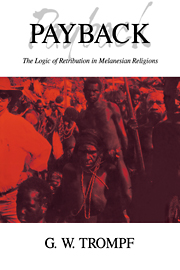Preliminaries: The Theory of Retributive Logic
Published online by Cambridge University Press: 22 September 2009
Summary
This book concerns itself with some of the more remarkable features of Melanesian life: payback killing or the taking of indiscriminate revenge on enemies; prodigious acts of generosity without guarantee of comparable returns; and intricate modes of explaining important social events, especially disaster, sickness, and death. It will be argued that vengeance, reciprocity and the means of interpreting social affairs are integrally related in most Melanesian worldviews, and that these traditional interrelationships help explain why Melanesia's adjustment to rapid technological and social change has its own special flavour. Behind the Melanesian pidgin term bekim (payback) lies the presumption that life, punctuated by dangerous feuding and competitions, coloured by the excitement of reciprocities and trade, is to be apprehended as a continuous interweaving of gains and losses, giving and taking, wealth and destitution, joy and sorrow, vitality and death. How Melanesians think about the significant events and situations affecting them, and how their thinking is translated into action, are points of inquiry covered by my phrase ‘the logic of retribution’.
Elsewhere I have used the idiom retributive logic of both biblical and Graeco-Roman beliefs about the divine distribution of rewards and punishments in history (Trompf 1979a: 93–106, 155–74, 231–41, 285–95; 1979b: 219–29; 1983a; 1990a; 1994). Here I define it as any logical framework of ideas enabling people to give reasons for their retaliations and concessions, and to interpret the dramatic changes of human existence in terms of rewards and punishments, praise and blame.
- Type
- Chapter
- Information
- PaybackThe Logic of Retribution in Melanesian Religions, pp. 1 - 18Publisher: Cambridge University PressPrint publication year: 1994

